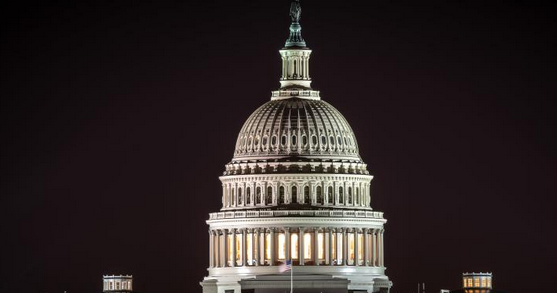Washington, D.C. – The looming threat of a U.S. government shutdown has intensified after the House of Representatives failed to pass a new spending bill. The legislation, which was supported by President-elect Donald Trump and crafted by Republican leaders, sought to extend government funding and suspend the debt ceiling but was met with significant internal opposition from GOP members.
The proposed bill, which was intended to keep government operations running smoothly and avoid a shutdown, included measures to extend funding through mid-March and push the debt ceiling discussions past Trump's inauguration into 2027. Despite these provisions, the bill encountered resistance from 38 Republican lawmakers, alongside a united Democratic front, leading to its rejection by a vote of 174-235.
This failure has thrown Congress into disarray as the deadline to fund government operations approaches. With less than 24 hours left before federal funding expires, the immediate concern is the potential disruption to government services, which could affect everything from national park maintenance to air traffic control.
House Speaker Mike Johnson, who had to navigate the challenging dynamics within his party, acknowledged the setback but expressed determination to find a resolution. "We will regroup and we will come up with another solution," Johnson stated, signaling ongoing efforts to negotiate a new path forward. However, with Democrats firmly against any last-minute, unilateral changes by Republicans, the path to a bipartisan agreement seems fraught with obstacles.
The involvement of Trump, even before officially taking office, has highlighted the significant influence he still wields within the GOP. His call for a streamlined bill without what he termed "Democrat giveaways" and a push for a debt ceiling suspension until 2027 added layers of complexity to the negotiations.
The fallout from this failed vote has sparked a blame game between the parties. Democrats have argued that the GOP's internal discord has led to this brinkmanship, potentially affecting federal workers' livelihoods and public services. On the other hand, some Republicans and Trump supporters view the situation as an opportunity to reset government spending priorities, although the practical implications of a shutdown are contentious.
As the clock ticks down to the midnight deadline, both chambers of Congress are under pressure to act. The Senate, which has a Democratic majority, will likely play a crucial role in any last-minute negotiations or votes. The situation underscores the ongoing challenges of governance in a politically divided U.S., where even basic budgetary agreements can lead to significant standoffs.
This scenario also reflects broader tensions within the Republican Party, showcasing the influence of Trump and his closest allies, like Elon Musk, on legislative outcomes. The next steps are uncertain, but what's clear is the urgency to avert a government shutdown that could have widespread effects across the nation.
